
|
Gladiator (2000)
In director Ridley Scott's spectacular
historical adventure epic - a popular Best Picture winner and
big-budget blockbuster (over $200 million) that revived the subgenre
of 'sword and sandal' films of the Roman Empire. (Although greatly
enhanced with CGI-digital effects, it revived the memory of dramatic
historic-epic films and 'sword-and-sandal' spectaculars of the 50s,
such as Quo Vadis? (1951), Ben-Hur
(1959) and Spartacus (1960).)
It told a basic tale of good
vs. evil, betrayal, and revenge in 180 A.D., in its story of the life
of an outcast Roman general (and single-minded rebel-hero) Maximus Decimus
Meridius (Russell Crowe) seeking vengeance for betrayal and his family's death.
- in the film's opening, heroic, capable and trusted
Roman army General Maximus Decimus Meridius delivered
an address to his troops before battling Germanic barbarians, under
the command of kindly Emperor Marcus Aurelius (Richard Harris): "Fratres!
Three weeks from now, I will be harvesting my crops. Imagine where
you will be, and it will be so. Hold the line! Stay with me! If
you find yourself alone, riding in green fields with the sun on
your face, do not be troubled, for you are in Elysium, and you're
already dead! Brothers: What we do in life echoes in Eternity"
- after the Romans were victorious
in battle due to Maximus' leadership, Marcus Aurelius was betrayed
by power-hungry Commodus (Joaquin Phoenix), his treacherous and devious
son, who was astounded when told he would not succeed to the Emperorship:
"You will not be emperor....My powers will pass to Maximus, to
hold in trust until the Senate is ready to rule once more. Rome is
to be a republic again." Commodus felt he had been rejected as
a son, and listed the virtues he had that his father hadn't recognized,
such as ambition, resourcefulness, courage, and devotion. He then asked:
"What is it in me you hate so much? All I ever wanted was to live
up to you, Caesar. Father." After Commodus' father admitted, as
he sank to his knees: "Your faults as a son is my failure as a
father," Commodus committed patricide in order to take the throne
away from his father, by asphyxiating and smothering his father as
he hugged him tightly: "Father.
I would butcher the whole world if you would only love me!"
- Maximus narrowly escaped execution during the change
of power when he was able to overpower the guards in the forest ordered
to kill him by Commodus; however, his own wife (Giannina
Facio) and young son (Giorgio Cantarini) were both murdered in their
home in Spain; Maximus arrived too late to save them - he discovered
the charred and crucified bodies of both his son and wife in the
smoldering home of their villa
- the spectacle of the Roman Colosseum's gladiatorial
battles and contests was balanced with royal intrigue involving the
resentful heir to the Roman throne
- the condemned, enslaved former
loyal General Maximus, turned Colosseum-gladiator named "The
Spaniard" (Russell Crowe), was trained by slave owner Antonius
Proximo (Oliver Reed) in Zucchabar in North Africa to fight in the
Roman Colosseum; Proximo wisely advised "The Spaniard": "Learn from
me. I was not the best because I killed quickly. I was the best because
the crowd loved me. Win the crowd and you will win your freedom"
- "The
Spaniard" decisively and bloodily butchered a number of hefty,
armored gladiators and then mocked and questioned the chanting crowds
to gain their popular support: "Are
you not entertained? Are you not entertained? Is this not why you
are here?"
- during a mock recreation of the Battle of Carthage
(Zama) that pitted Carthaginian Barbarians (the original losing side)
against Roman competitors (the original winners), the "Spaniard" urged
Proximo's gladiators to work together as a team: "Whatever
comes out of these gates, we've got a better chance of survival if
we work together"; he led them to a decisive victory against
the more powerful forces.
- in a dramatic scene after the
spectacular victory, treacherous Roman Emperor Caesar Commodus descended
into the arena to congratulate the winners - and Commodus ordered
the lead gladiator ("The Spaniard") to identify himself.
The heroic "Spaniard" introduced
himself: "My name is Gladiator," but then when he was confronted
and ordered to remove his face-hiding helmet and reveal his true
identity and name - he slowly turned, removed his disguising helmet,
and defiantly declared vengeance for the assassination of the elderly
Emperor Marcus Aurelius and the brutal murder of his own family "My
name is Maximus Decimus Meridius, Commander of the Armies of the North.
General of the Felix Legions and loyal servant to the TRUE emperor, Marcus
Aurelius. Father to a murdered son, husband to a murdered wife. And I
will have my vengeance, in this life or the next"; the crowd chanted: "Live,
live, live!" - refusing to allow the Emperor to slay his opponent
- and he gave a thumbs up signal ("Guards, at rest!")
- meanwhile, the Emperor had a twisted and incestuous
relationship with his sister Lucilla (Connie Nielsen), a widowed
single mother, while she romanced Maximus
- further hellish action sequences of battle
occurred in the Colosseum (with chained tigers - often digitized)
when Commodus exclaimed: "At my signal, unleash hell" - "The
Spaniard" fought without his mask single-handedly in an intense battle in the Colosseum
against Rome's only undefeated gladiator - the legendary Tigris of
Gaul (Sven-Ole Thorsen) in which Maximus defied the Emperor's thumbs-down
decision to kill his wounded opponent Tigris
- in the meantime, the increasingly-unstable Commodus
learned of a growing conspiracy against him, led by Maximus who was
planning to assemble his loyal legions, overthrow the illegitimate
Emperor, and give back power to the Senate; he described the plotting
against him with a comparison to past Roman history: ("The emperor
Claudius knew that they were up to something. He knew they were busy
little bees"); Maximus was able to briefly escape but was captured,
while Proximo and other gladiators were killed
- to gain public favor, Commodus
personally challenged Maximus to engage in a final confrontational
one-on-one battle to-the-death with him in the "great arena": "The
general who became a slave. The slave who became a gladiator. The
gladiator who defied an emperor. Striking story! But now, the people
want to know how the story ends. Only a famous death will do. And
what could be more glorious than to challenge the Emperor himself
in the great arena?"
- Commodus first stabbed Maximus in the chest
(puncturing his lung) with a stiletto while he was bound, to
gain an advantage and win approval from the crowd; during the contest
in his last moving moments of life, the mortally-wounded, slowly
dying Maximus vengefully stabbed the Emperor in the throat with his
own hidden stiletto and killed him, after Commodus had dropped his
sword and no one would provide him with another (Quintus (Tomas Arana)
had shouted: "Sheathe your swords!")
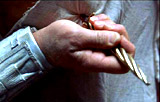
|
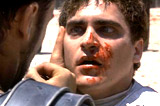
|
|
Commodus Stabbed to Death
|
- weary and dying from his own wounds, Maximus saw himself
entering into his home's wooden gates in the afterlife, before dying,
he ordered Quintus: "Free my men, Senator Gracchus is to be reinstated. There was
a dream that was Rome. It shall be realized. These are the wishes of
Marcus Aurelius"
- as he succumbed in the arms of Commodus' sister Lucilla,
his own ex-lover, he told her (his final words) that her own son
Lucius (Spencer Treat Clark) was safe: "Lucius is safe";
she urged him to go to his own murdered family: "Go to them";
as he perished, his body floated upwards and he experienced visions
of his family in the afterlife as they greeted him on a dusty road
and he was wading through waving yellow reeds; she reassured that
he had greeted them: "You're home"
- Lucilla stood up and addressed everyone:
"Is Rome worth one good man's life? We believed it once. Make
us believe it again. He was a soldier of Rome. Honor him."
Fellow gladiators surrounded Maximus and carried his body out of the
arena
- the film's conclusion: newly-freed gladiator Juba
(Djimon Hounsou) buried Maximus' two small statues of his wife
and son in the dirt of the Colosseum where Maximus died ("Now
we are free. I will see you again, but not yet. Not yet")
|

During Battle, Maximus: "Hold the line! Stay with
me!"

Maximus' Discovery of the Murder of His Family Members


Murderous Commodus (Joaquin Phoenix) Upset at Being Passed Over as the New Emperor
by His Father Marcus Aurelius (Richard Harris)

Maximus Fighting Off His Would-Be Executioners In the Forest
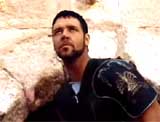
The Entrance of "The Spaniard" Into the Arena
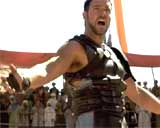
"The Spaniard" in the Arena: "Are you not entertained?
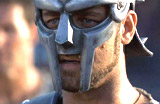
In the Colosseum: "My name is Gladiator"

"My name is Maximum Decimus Meridius..."

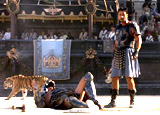
"The Spaniard's" Fight Against the Legendary Tigris
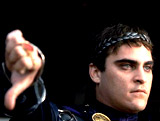
"Thumbs Down" Order Defied by The "Spaniard"
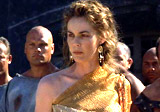
Lucilla's Address After Maximus' Death
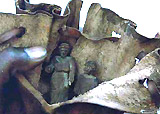
Burial of Two Statues
|















